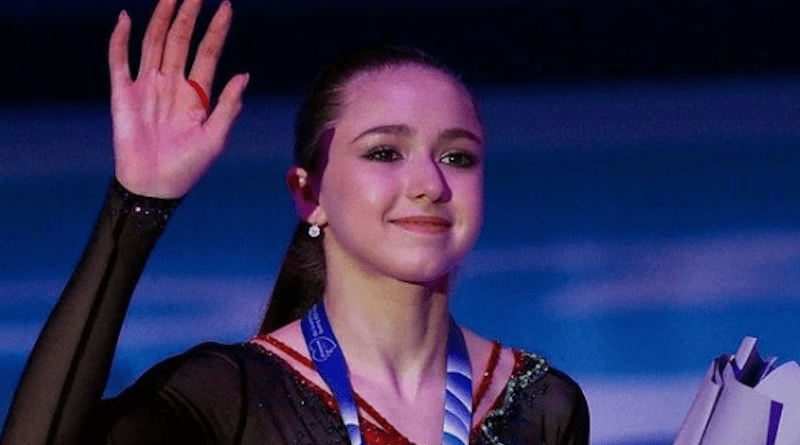Kamila Valieva Coverage Reveals Sordid Values – OpEd
UK Foreign Secretary Liz Truss has clearly shown a lack of adeptness at her job. This was exhibited during a February 10 press conference she had with Russian Foreign Minister Sergey Lavrov. There’s also a believable leak of a gaffe Truss made in another interaction with Lavrov.
Western mass media has been generally lax towards her on the job shortcomings, as she holds a key foreign policy position for a country having some global clout (albeit decreased from a previous time). The comparative treatment accorded to Russian teen figure skating sensation Kamila Valieva, her fellow Russian Olympians and their country, is another example of gross arrogance, ignorance, hypocrisy and bigotry.
Bruce Arthur’s Toronto Star articles of February 9,10 and 11 articles are quite collapsible when factually challenged. A further low point is evident with Tony Kornheiser’s February 10 bigoted comments on ESPN’s Pardon The Interruption. There’re numerous other Western mass media takes, having the same slants as Arthur and Kornheiser.
Arthur spins the inaccurate image of an oppressive Russia downplaying the use of performing enhancing drugs. Two different Russian media venues reported Valieva testing positive for a banned substance, before this was formally acknowledged. Within a short time span, other Russian media outlets followed up on the coverage of the claim.
At the time of his February 9 and 10 articles, Arthur couldn’t be sure whether Valieva had taken the banned drug Trimetazidine. Arthur omits some facets involved with getting tested for that drug. The World Anti-Doping Agency (WADA) notes that a false positive result for Trimetazidene is quite possible when taking Lomerizine (used to treat migraines), which isn’t banned. Elsewhere, it has been noted how it’s possible for Trimetazdine to be included as an ingredient in a non-banned drug.
Before the rescheduled 2020 Tokyo Summer Olympics, Russian hurdler Sergey Subchenkov was cleared of wrongdoing, related to the initial misinterpretation of a test result. It should go without saying that Valieva and her entourage, have every right to challenge the doping claim made against her.
In his February 9 piece, Arthur disingenuously portrays Russian speed skater Olga Faktulina as someone who had a doping charge “overturned by CAS in eyebrow-raising fashion.” Recognized by the International Olympic Committee and WADA, the Committee for Arbitration of Sport (CAS), is a Swiss based legal organization which reviews the appeals of contested decisions. Over the course of time, Russians and non-Russians have won and lost their respective CAS appeals.
Upon a further CAS review, Faktulina and some other Russian athletes were found to have been wrongfully charged with a doping infraction. In a move serving as a kind of middle finger to the likes of Arthur, the reinstated Faktulina was selected as the Russian Olympic Committee flag bearer at the opening ceremony of the 2022 Beijing Winter Olympics.
In his February 10 article, Arthur uncritically mentions the drug cheat Yulia Stepanova, who got busted for taking a banned substance. Thereafter, Stepanova achieved fame for ratting out two of her fellow Russian 800 meter runners. Along with her ex-husband, Stepanova appeared in a German TV aired propaganda film, which made a broad and unsubstantiated claim against Russian track and field athletes.
The gold medal contending Subchenkov was banned from the 2016 Rio Summer Olympics, along with the legendary Russian pole vaulter Yelena Isinbayeva. The World Athletics body governing track and field, maintains a decidedly biased stance against Russians. There’s a discriminatory quota policy on the number of Russians allowed to compete at major international track and field events.
Subchenkov and Isinbayeva were never found to have cheated unlike Stepanova. Yet, World Athletics head Sebastian Coe lobbied for Stepanova to compete at Rio, unlike Subchenkov and Isinbayeva.
In his February 11 piece, it’s no surprise to see Arthur uncritically reference the US sports legal politico Travis Tygart. The latter has repeatedly advocated a blanket ban on all Russian Olympic athletes.
At the highest level of athletic competition, Russians continue to participate and excel in noticeable numbers, while being probably the most drug tested of athletes. It stands to reason that if they were so guilty of cheating, they’d be caught en masse and penalized. This very point explains why most Russians and some non-Russians understandably see a politicized farce influencing the “Russian Olympic Committee” (in place of Russia) designation and Olympic banning of Russia’s flag and anthem.
In 2010, Kornheiser was suspended by ESPN, for making remarks about how his colleague Hannah Storm looks in her wardrobe. I’ll be pleasantly surprised to see Kornheiser getting reprimanded for his bigoted outburst against Russians.
Kornheiser’s collective description of Russians as cheats brings to mind The New York Times’ Juliet Macur distinguishing between “clean athletes and Russians“. As I noted: “No NYT journo would write a bigoted comparison that differentiates between law abiding citizens and African-American, followed by a utilization of crime statistics as ‘proof’ for such a presented contrast.”
Whatever the outcome, Valieva’s situation is more the exception than norm. In the US, Black and Latin-American athletes have influenced networks like ESPN to be more understanding of their concerns. I’m sure that many of the patriotically proud Russian NHL players and their brethren in North America, are justifiably disgusted with the aforementioned coverage.
Michael Averko is a New York based independent foreign policy analyst and media critic.

